Nurses' Narratives - Sister E H Cuthbert - May 1915 to December 1915
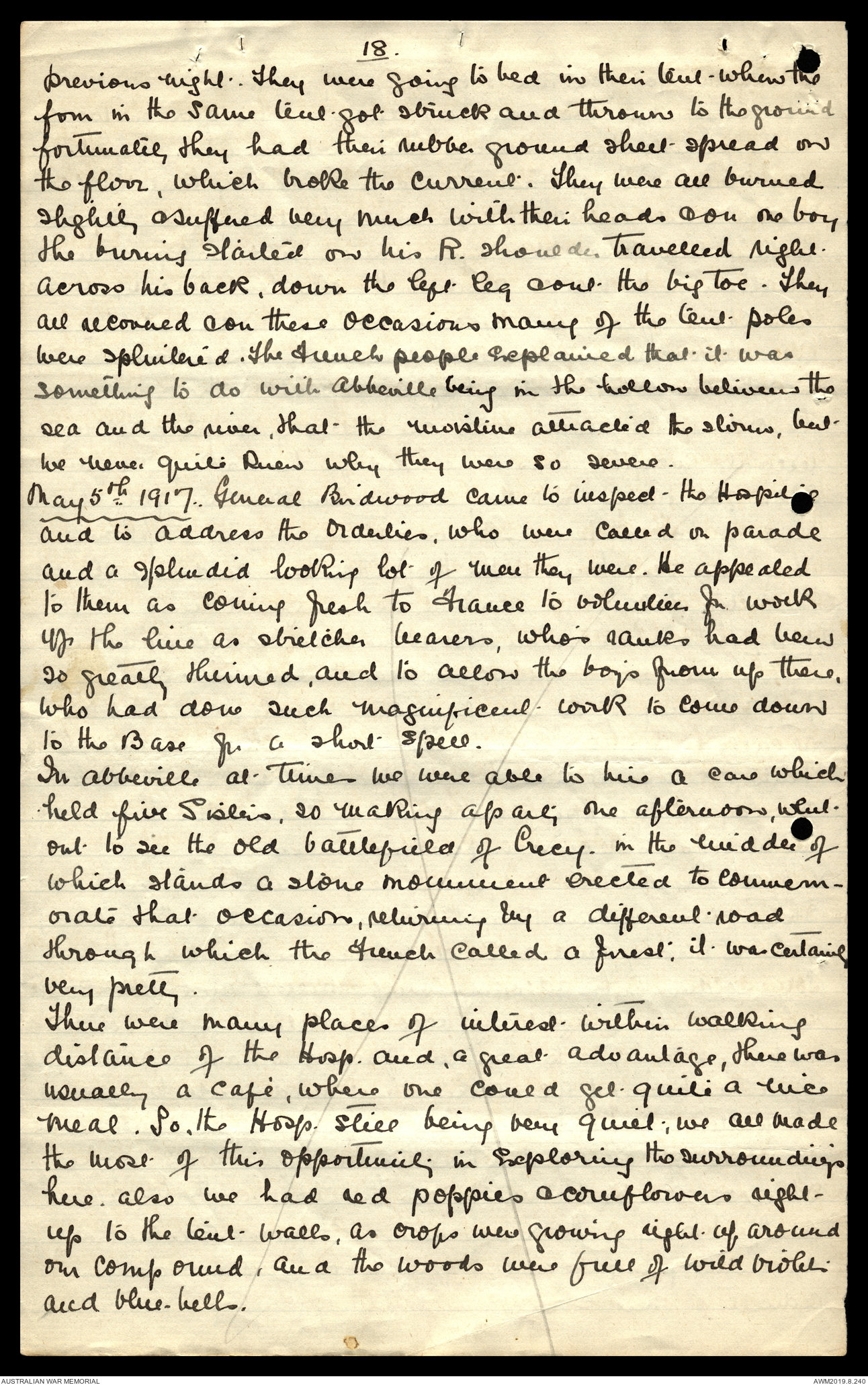
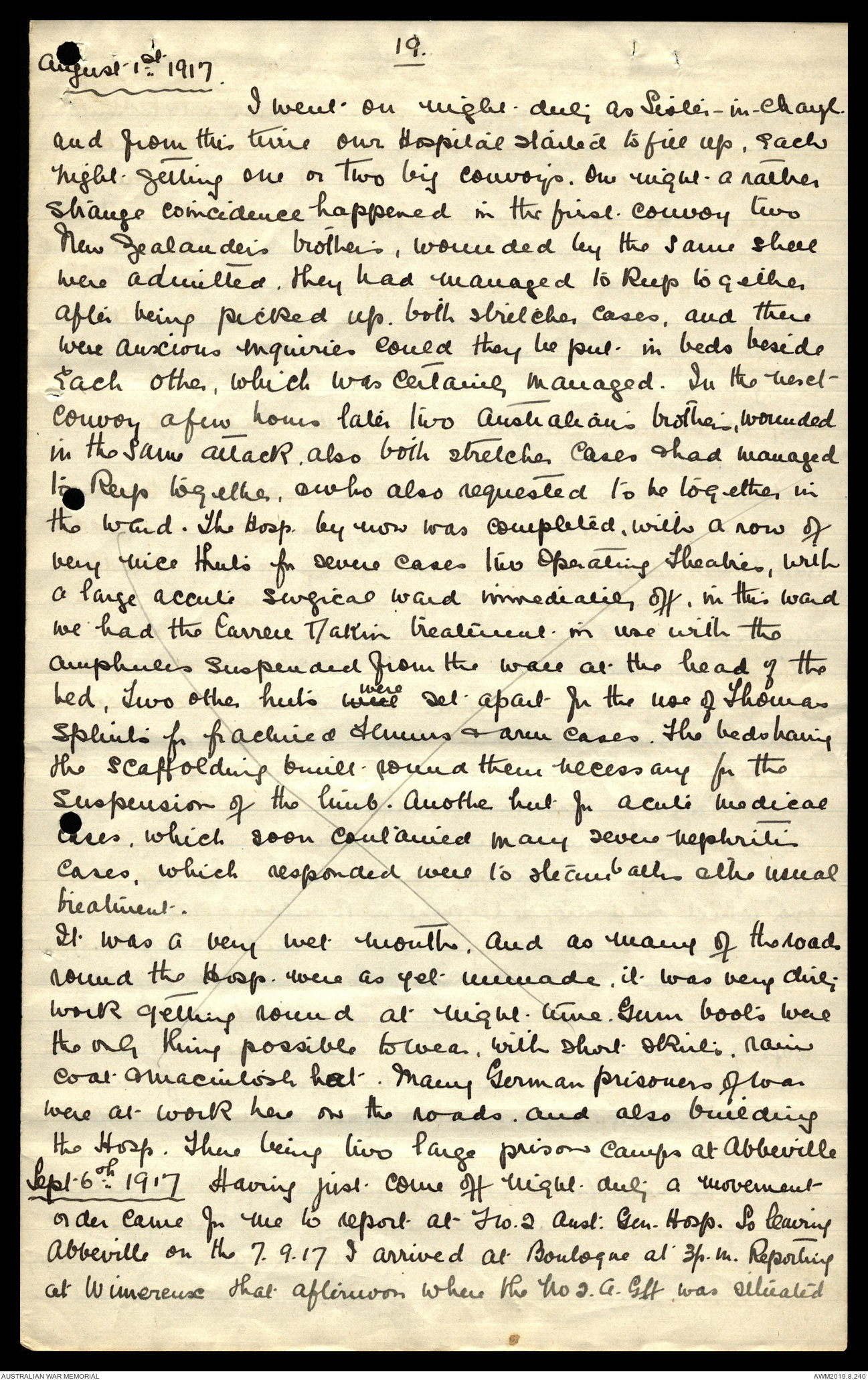
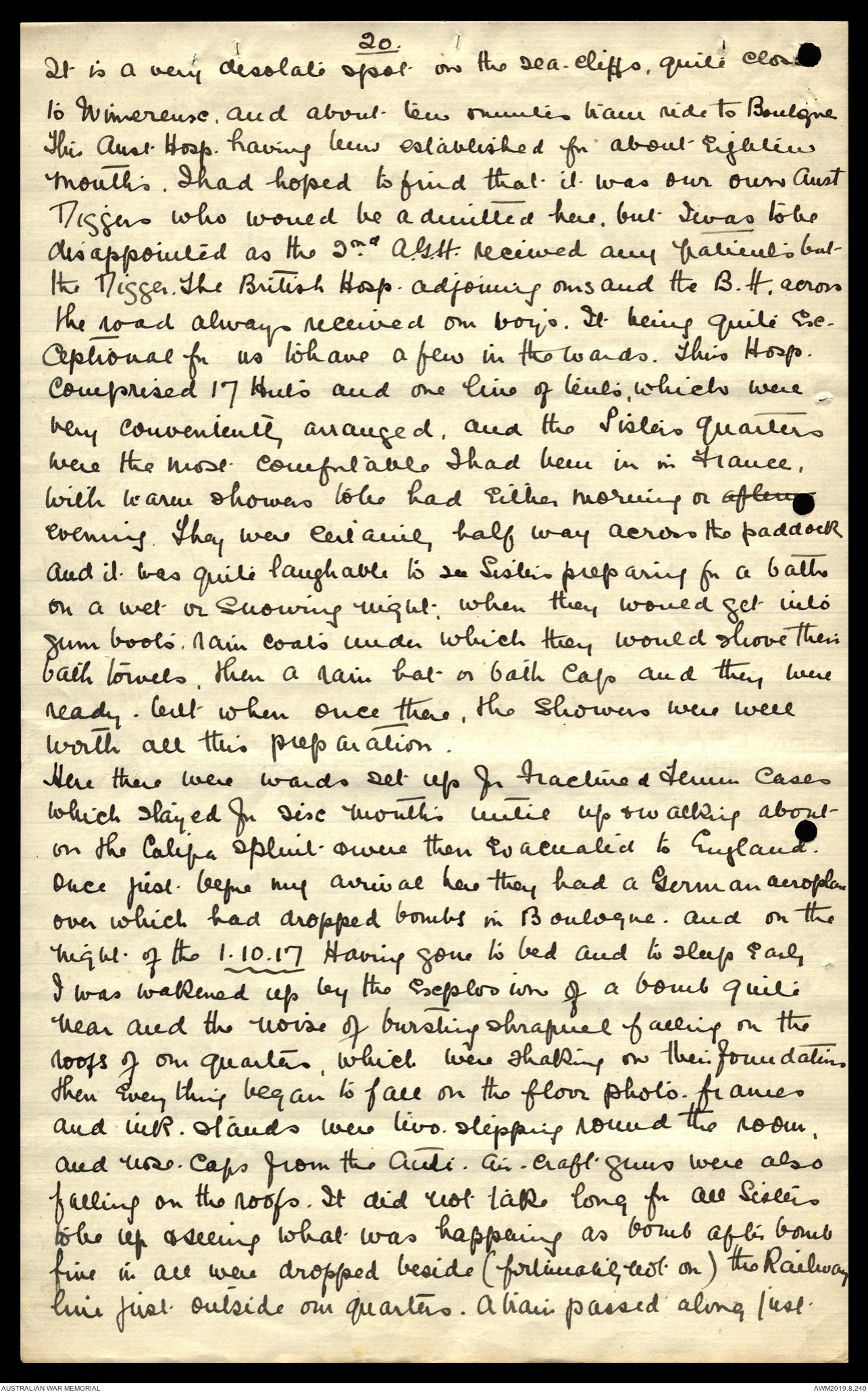
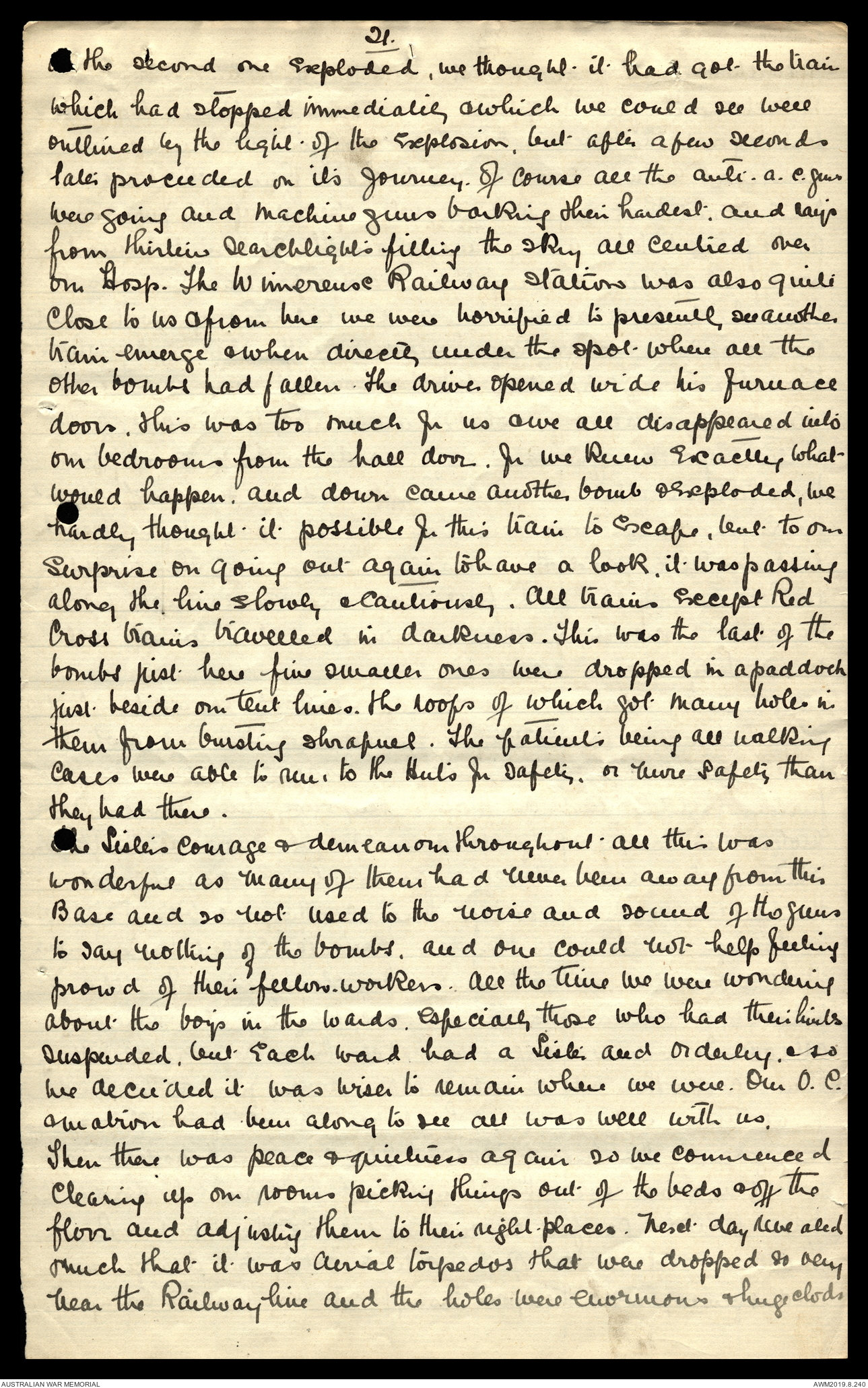
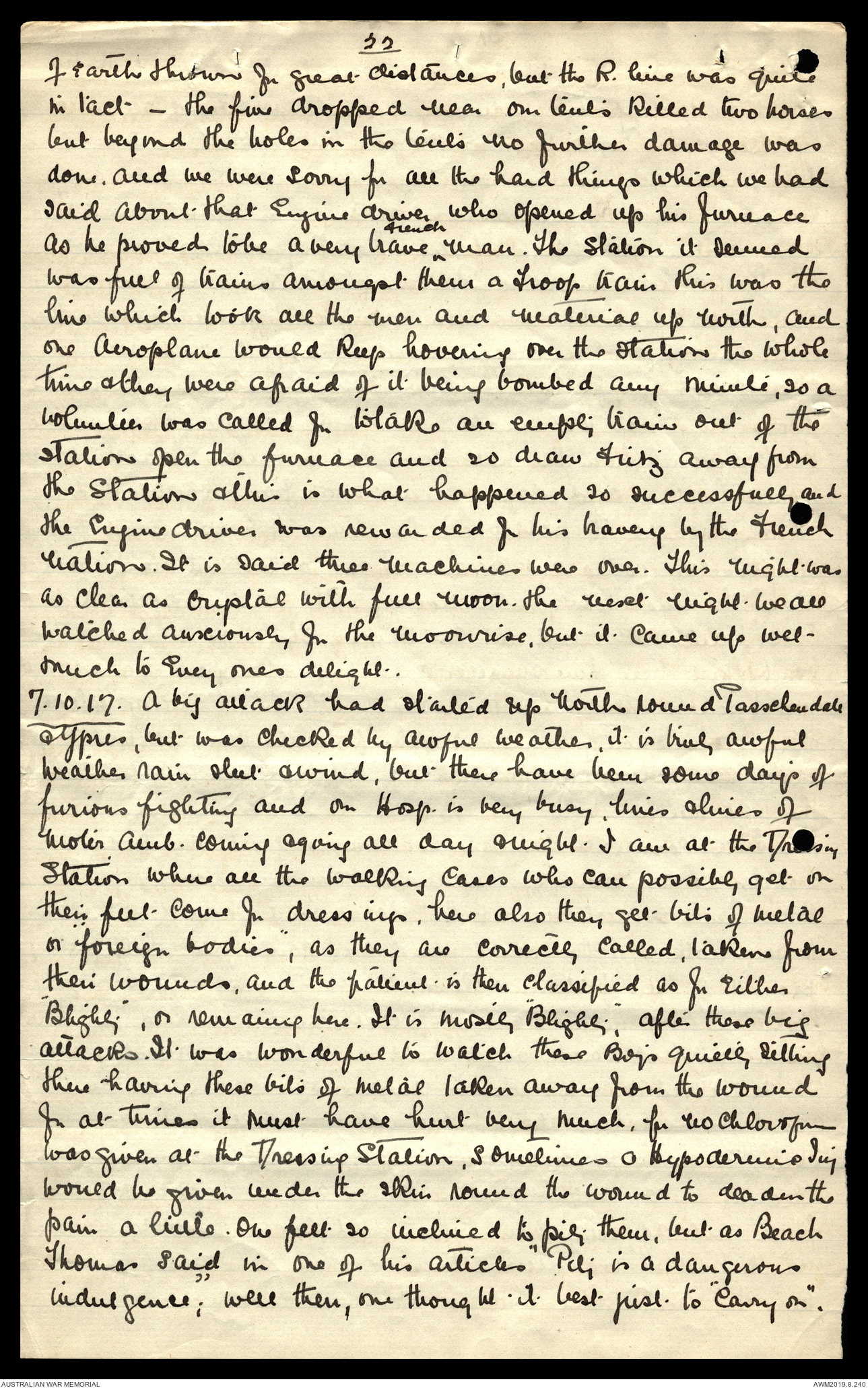
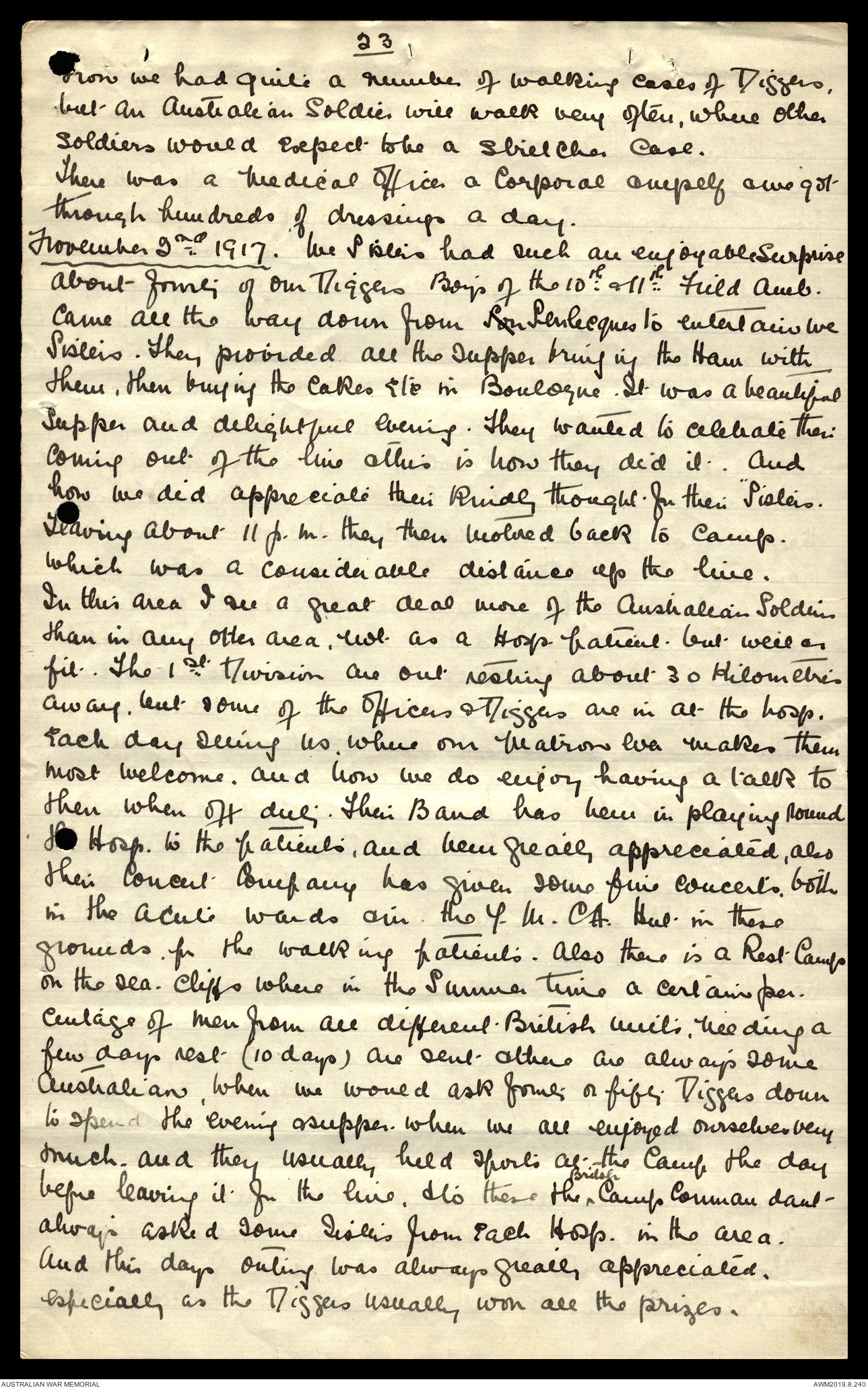
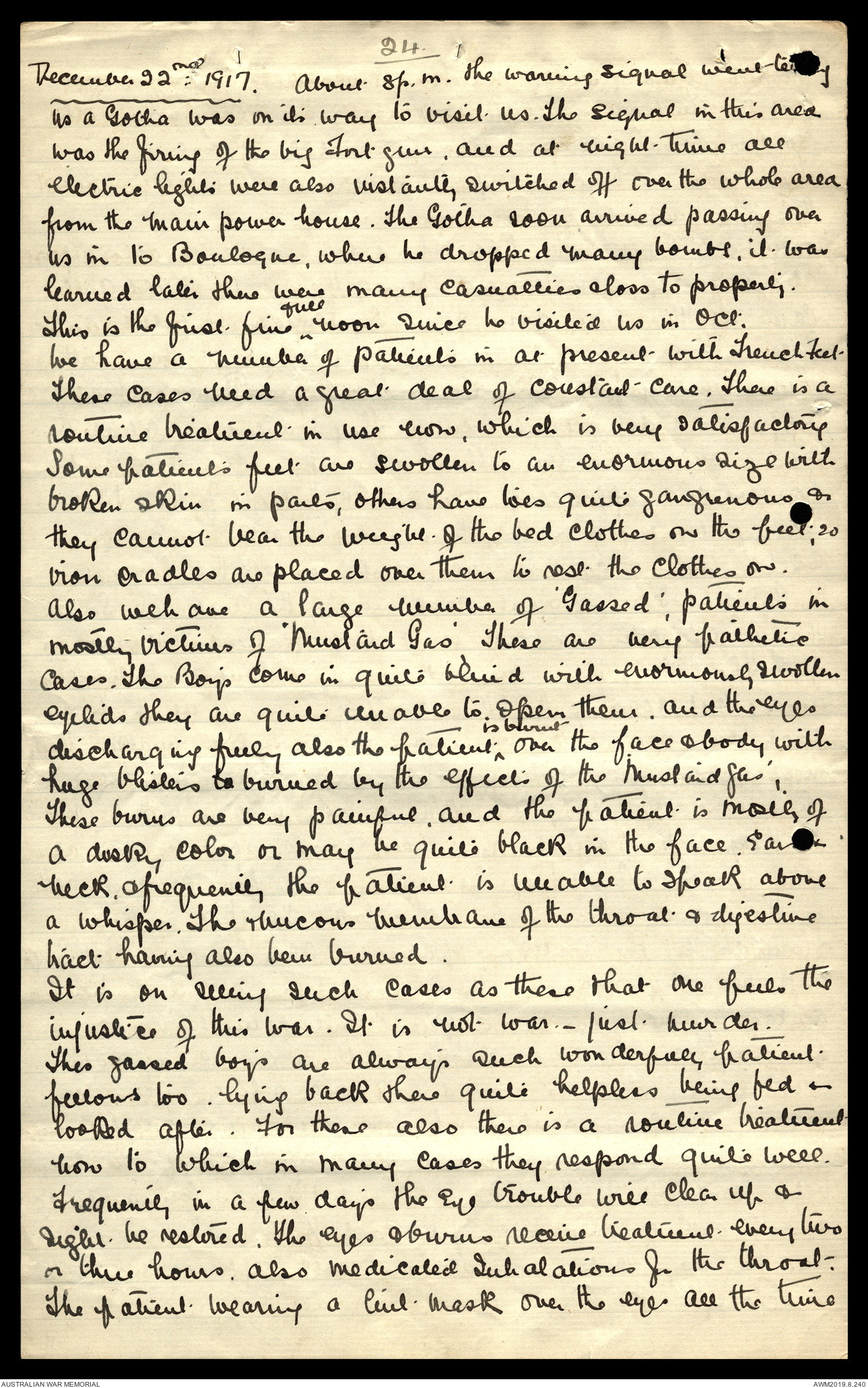
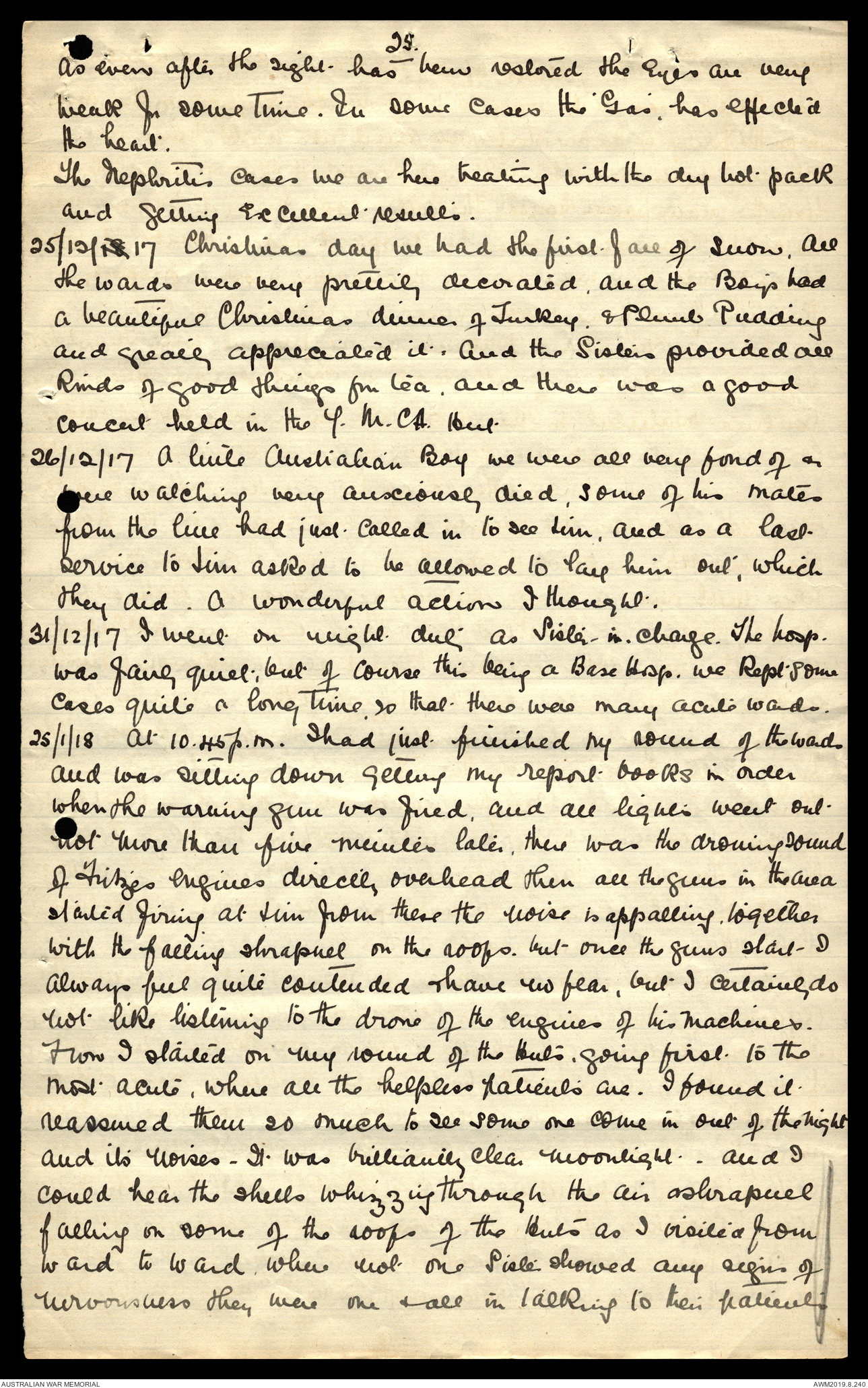
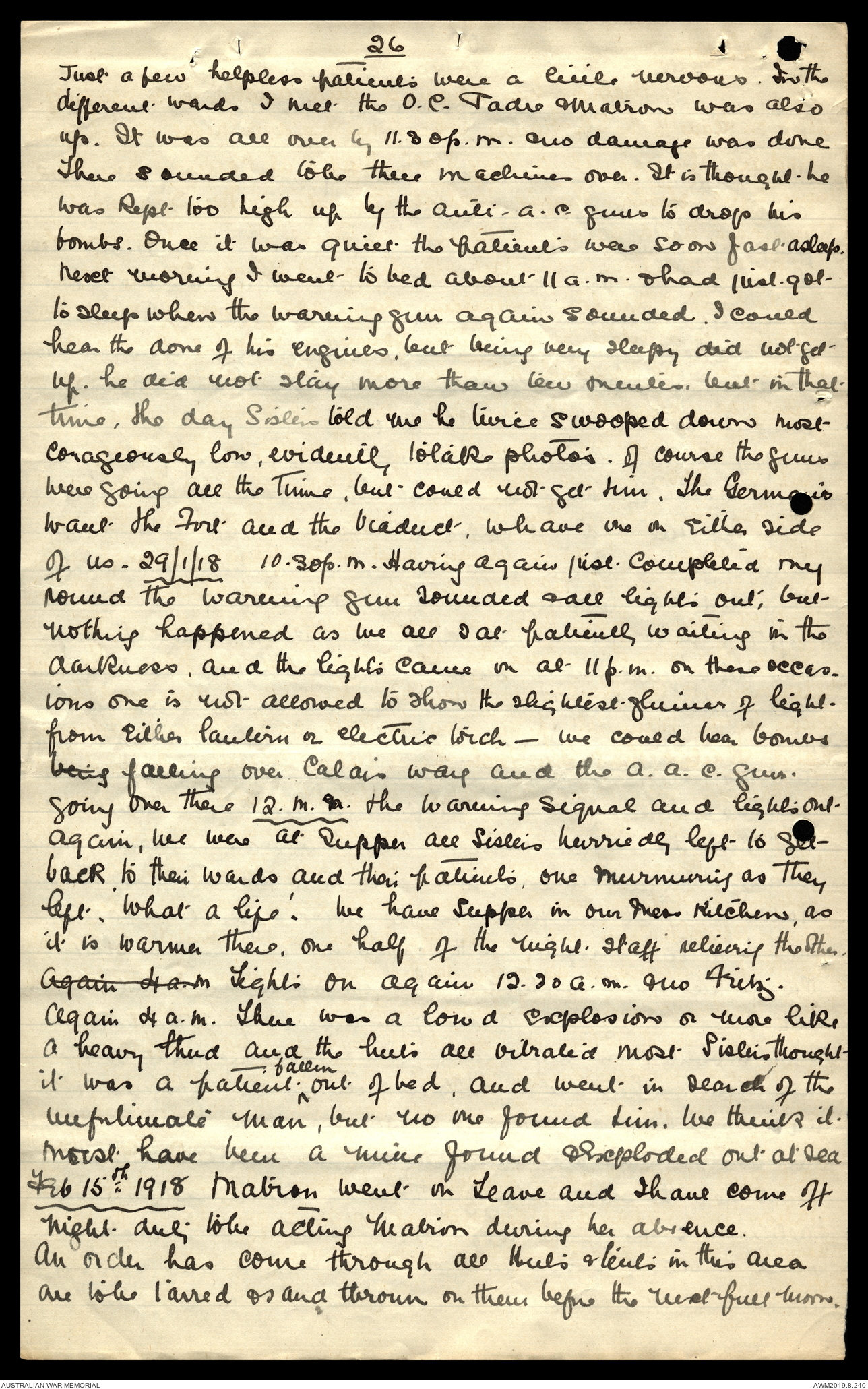
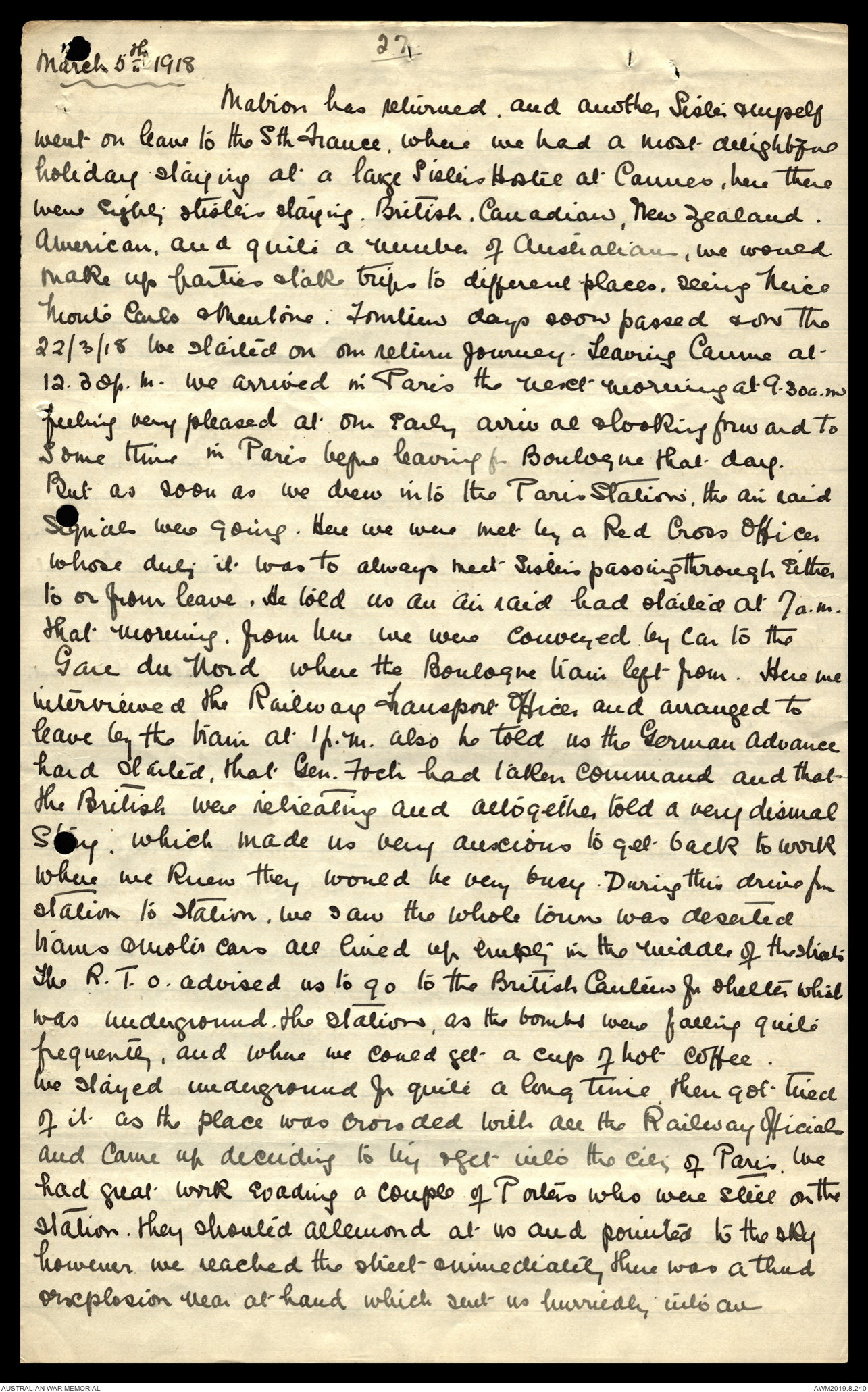
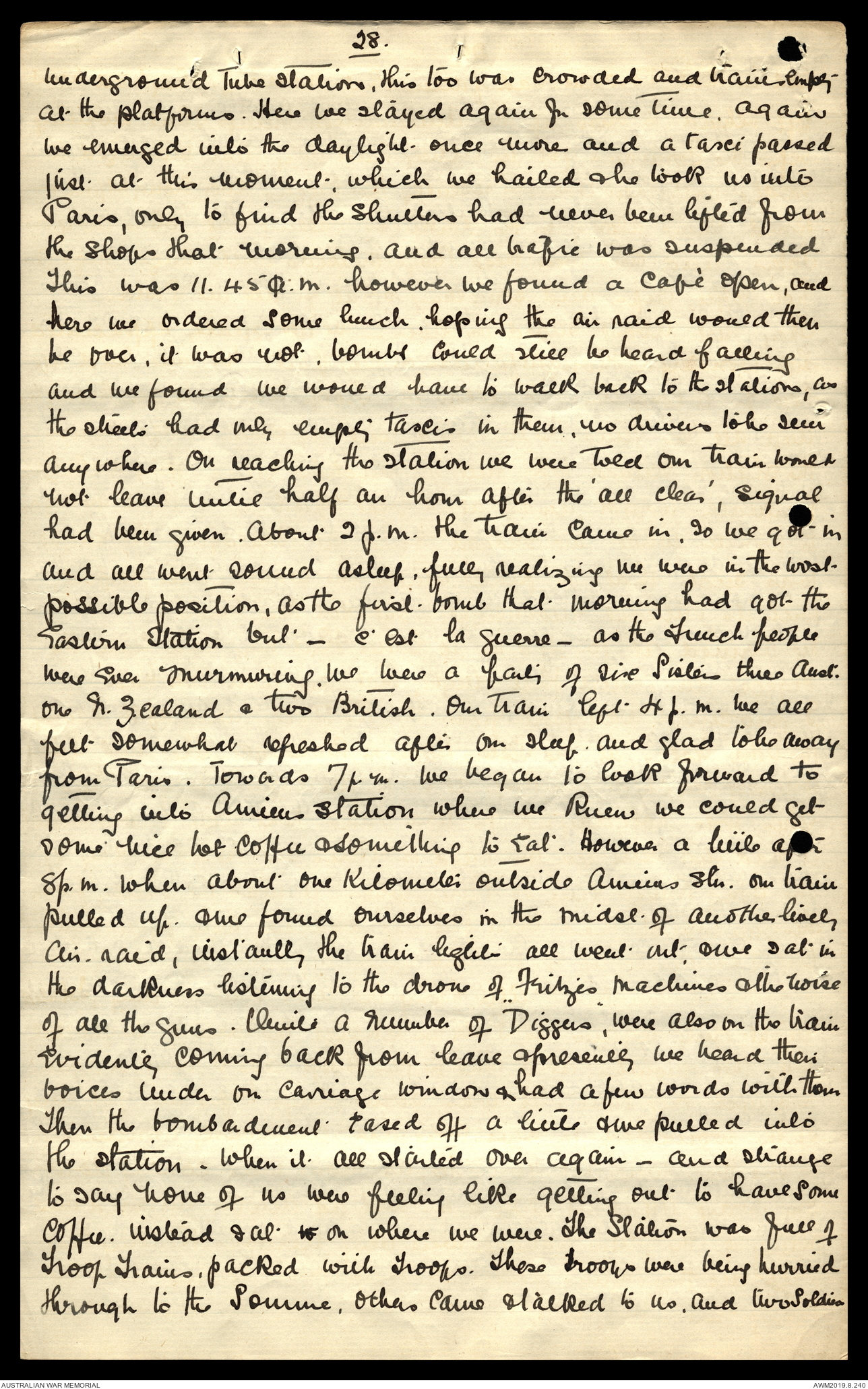
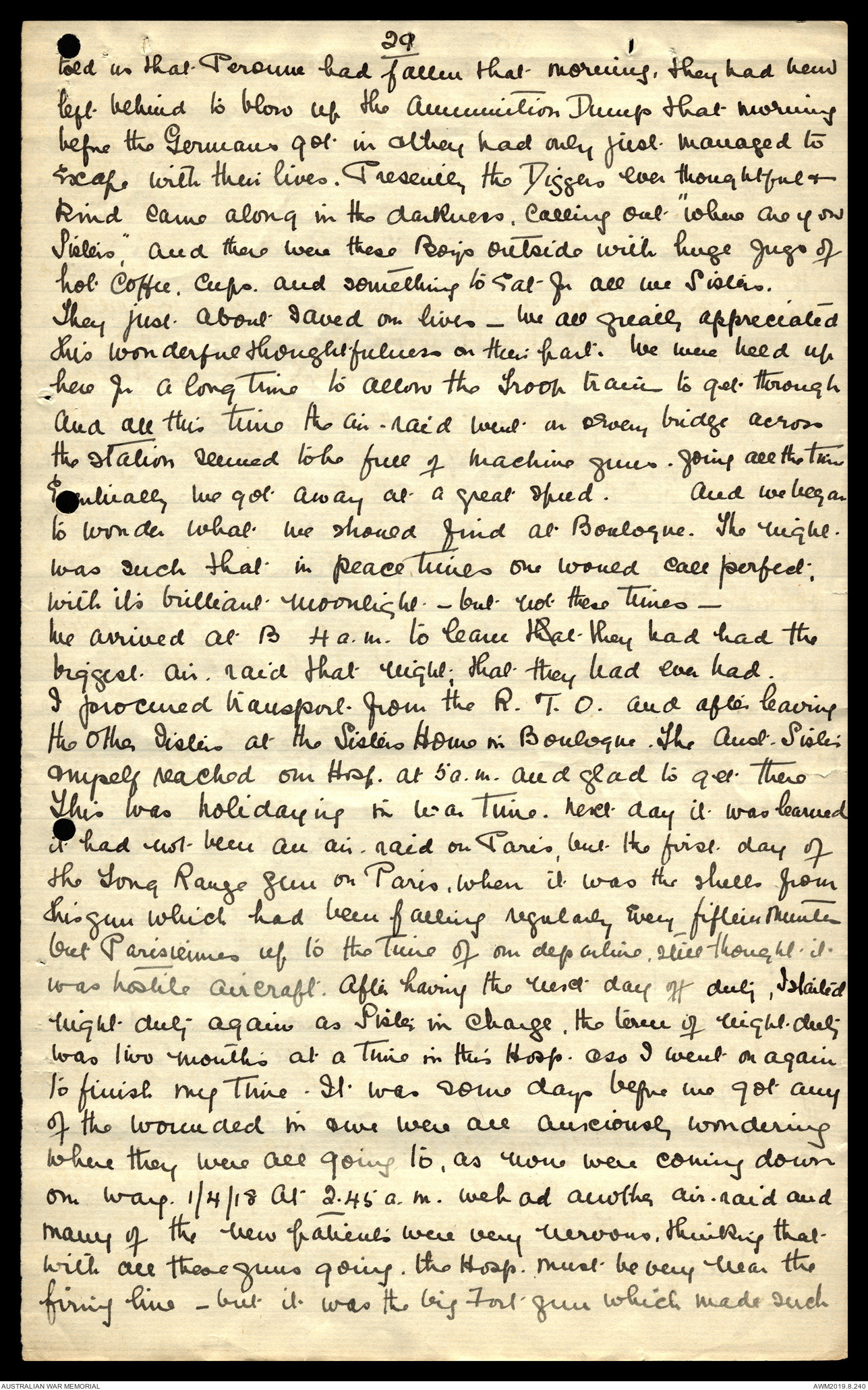
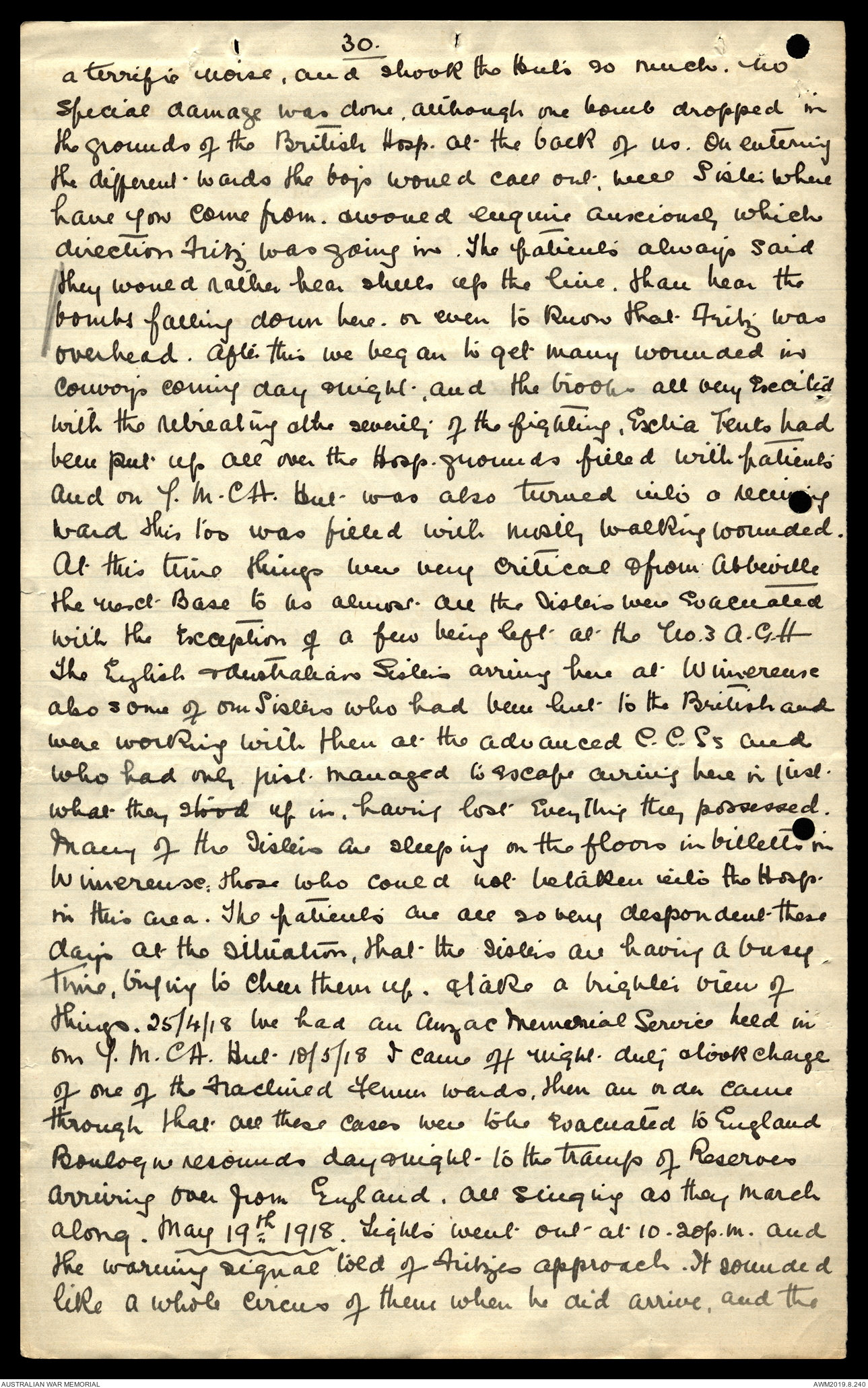
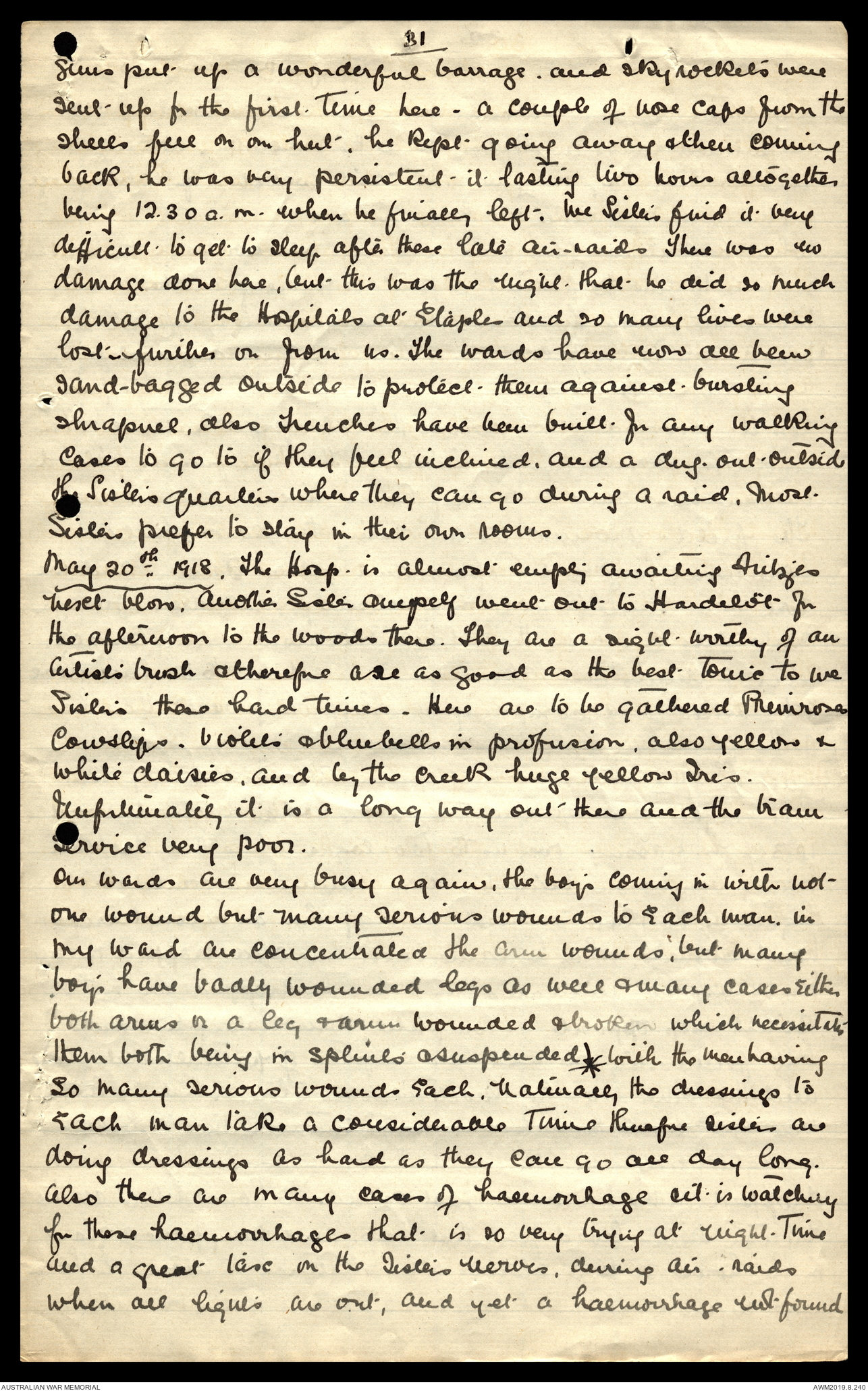
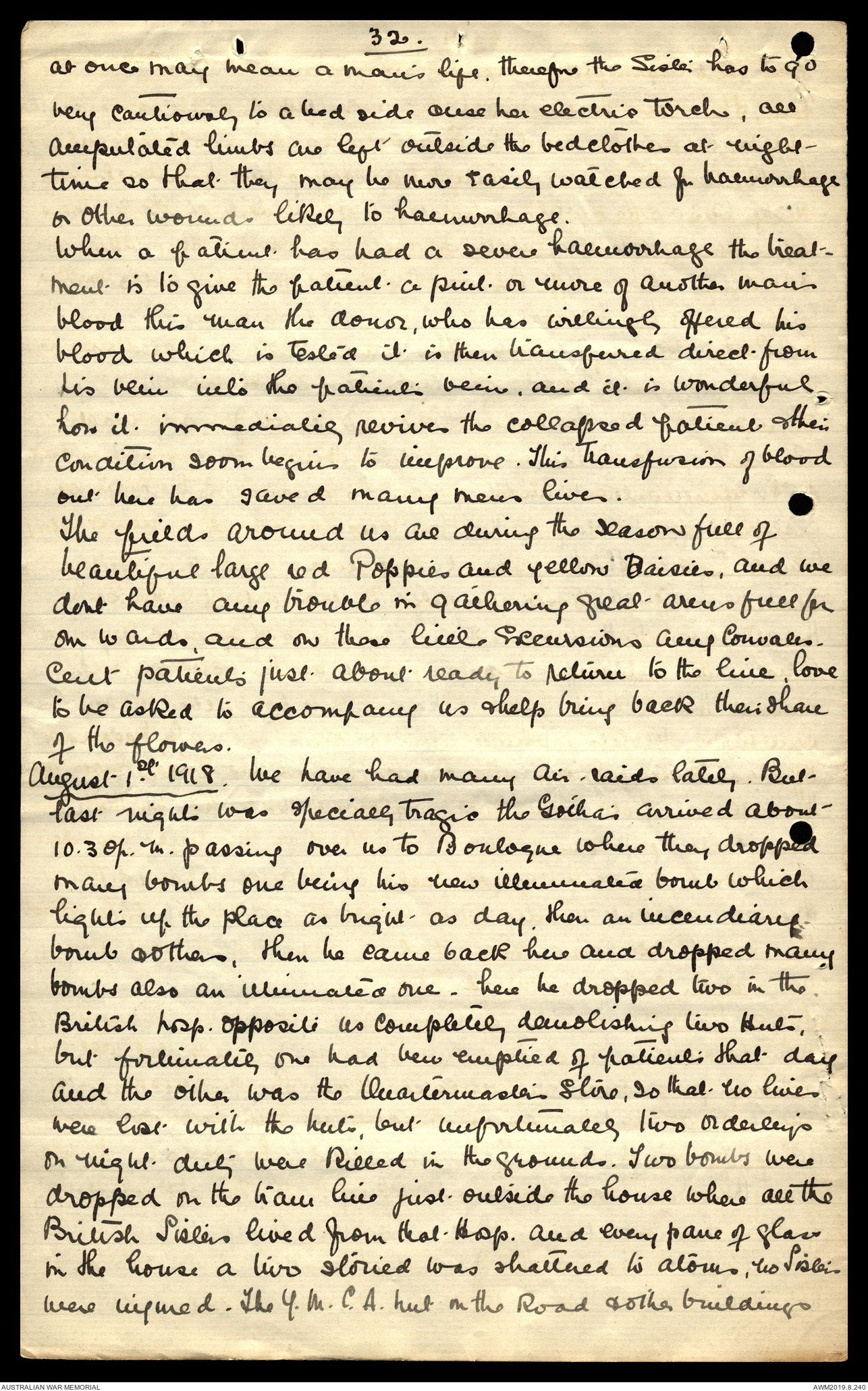
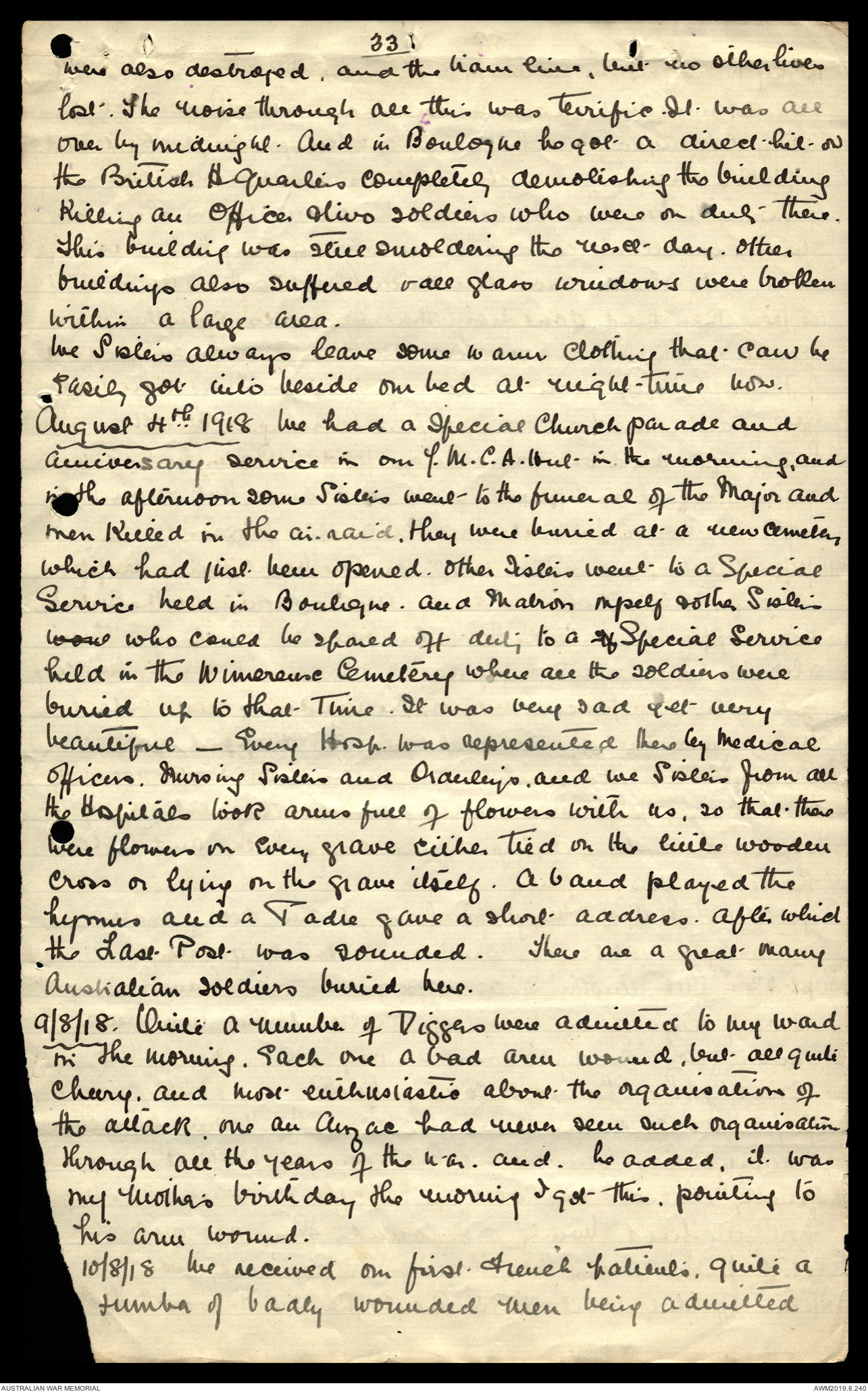
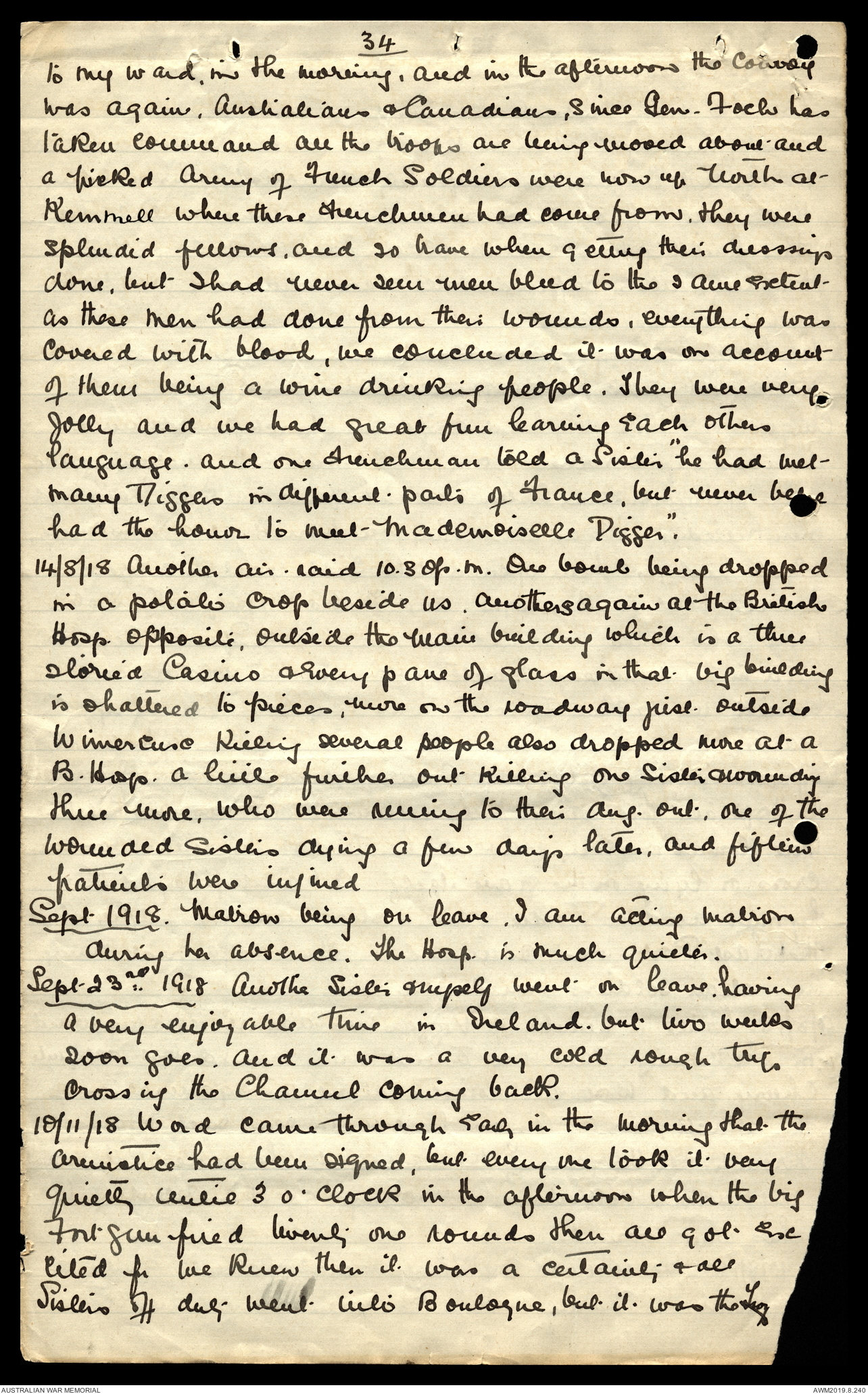
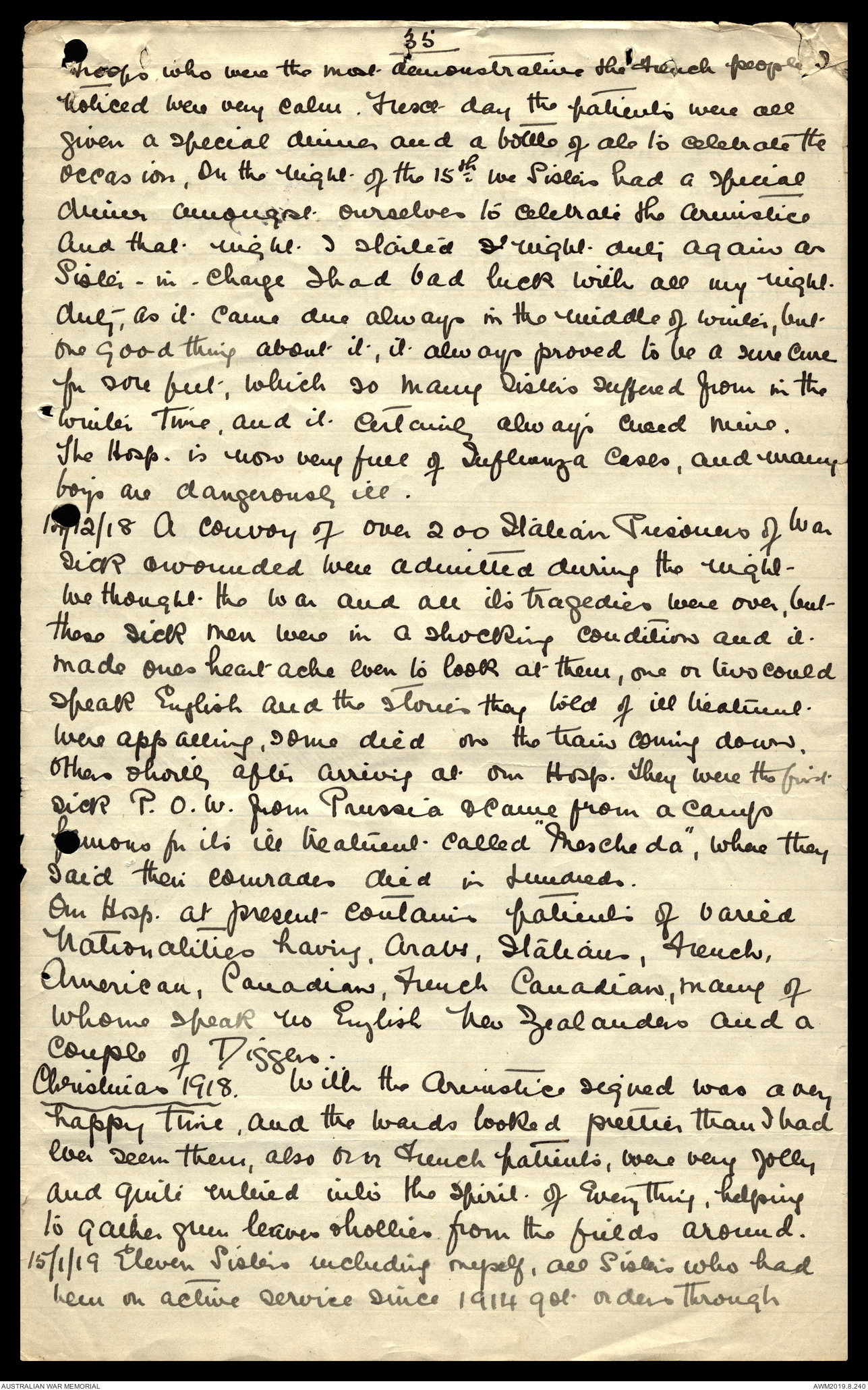
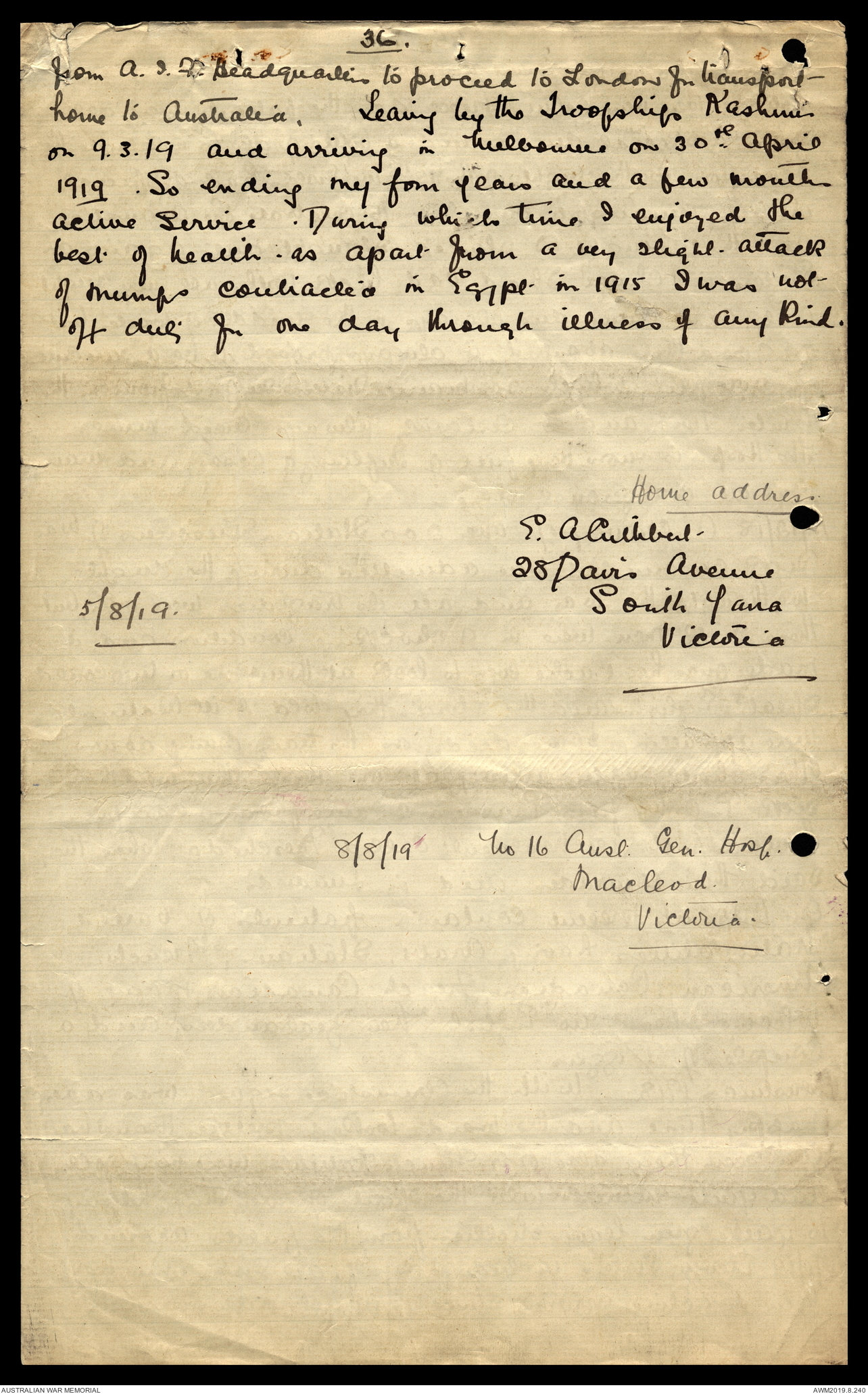
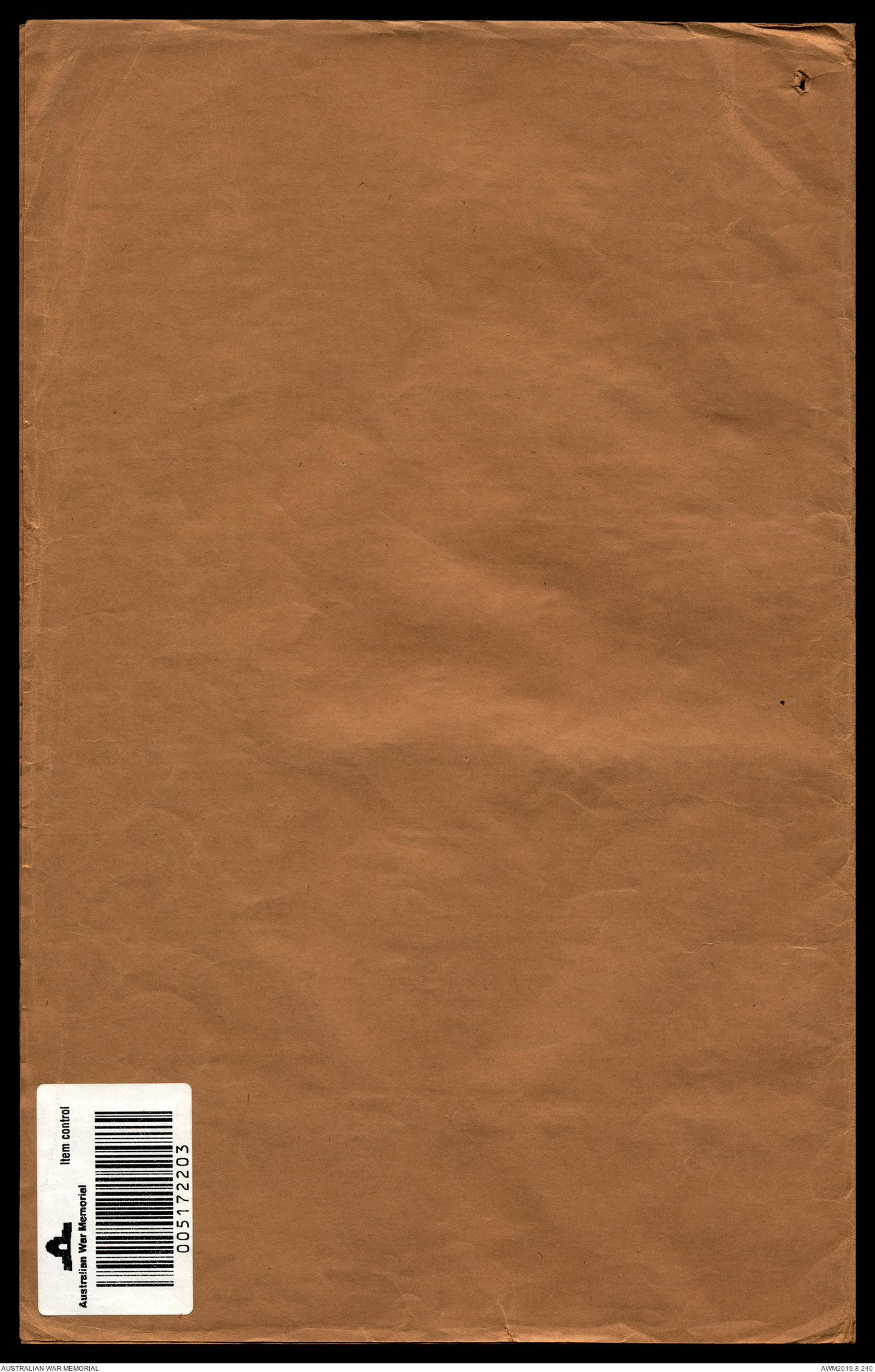
18.
previous night. They were going to bed in their tent when the
four in the same tent got struck and thrown to the ground
fortunately, they had their rubber ground sheet spread on
the floor, which broke the current. They were all burned
slightly & suffered very much with their heads & on one boy
the burning started on his R. shoulder travelled right
across his back, down the left leg & out the big toe. They
all recovered & on these occasions many of the tent poles
were splintered. The French people explained that it was
something to do with Abbeville being in the hollow between the
sea and the river, that the moisture attracted the storms, but
we never quite knew why they were so severe.
May 5th 1917. General Birdwood came to inspect the Hospital
and to address the orderlies, who were called on parade
and a splendid looking lot of men they were. He appealed
to them as coming fresh to France to volunteer for work
up the line as stretcher bearers, who's ranks had been
so greatly thinned, and to allow the boys from up there,
who had done such magnificent work to come down
to the Base for a short spell.
In Abbeville at times we were able to hire a car which
held five Sisters, so making a party one afternoon, went
out to see the old battlefield of Crecy, in the middle of
which stands a stone monument erected to commemorate
that occasion, returning by a different road
through which the French called a forest; it was certainly
very pretty.
There were many places of interest within walking
distance of the Hosp. and, a great advantage, there was
usually a café, where one could get quite a nice
meal. So, the Hosp. still being very quiet; we all made
the most of this opportunity in exploring the surroundings
here. Also we had red poppies & cornflowers right
up to the tent walls, as crops were growing right up around
our compound, and the woods were full of wild violets
and blue-bells.
19.
August 1st 1917
I went on night-duty as Sister-in Charge
and from this time our Hospital started to fill up, each
night getting one or two big convoys. One night-a rather
strange coincidence happened in the first convoy two
New Zealander's brothers, wounded by the same shell
were admitted. They had managed to keep together
after being picked up, both stretcher cases, and there
were anxious enquiries could they be put in beds beside
each other, which was certainly managed. In the next
convoy a few hours later two Australians brothers, wounded
in the same attack, also both stretcher cases & had managed
to keep together, & who also requested to be together in
the ward. The Hosp by now was completed, with a row of
very nice Huts for severe cases two operating theatres, with
a large accute surgical ward immediatily off, in this ward
we had the Carrell Dakin treatment in use with the
amphules suspended from the wall at the head of the
bed. Two other huts were set apart for the use of Thomas
Splints for fractured femurs & arm cases. The beds having
the scaffolding built round them necessary for the
suspension of the limb. Another hut for acute medical
cases, which soon contained many severe nephritis
cases, which responded well to steam baths & the usual
treatment.
It was a very wet month, and as many of the roads
round the Hosp. were as yet unmade, it was very dirty
work getting round at night time. Gum boots were
the only thing possible to wear, with short skirts, rain
coat & macintosh hat. Many German prisoners of war
were at work here on the roads, and also building
the Hosp. There being two large prison camps at Abbeville
Sept 6th 1917 Having just come off night duty a movement
order came for me to report at No.2 Aust. Gen. Hosp. So leaving
Abbeville on the 7.9.17 I arrived at Boulogne at 3p.m. Reporting
at Wimereux that afternoon where the No. 2. A.GH was situated.
20
It is a very desolate spot on the sea-cliffs, quite close
to Wimereux, and about ten minutes train ride to Boulogne.
This Aust. Hosp. having been established for about eighteen
months. I had hoped to find that it was our own Aust
Diggers who would be admitted here, but I was to be
disappointed as the 2nd A.G.H. received any patients but
the Digger. The British Hosp. adjoining ours and the B.H. across
the road always received our boys. It being quite exceptional
for us to have a few in the wards. This Hosp.
comprised 17 Huts and one line of tents, which were
very conveniently arranged, and the Sisters quarters
were the most comfortable I had been in in France,
with warm showers to be had either morning or
evening. They were [[certanily?]] half way across the paddock
and it was quite laughable to see Sister preparing for a bath
on a wet or snowing night, when they would get into
gum boots, rain coats under which they would shove their
bath towels, then a rain hat or bath cap and they were
ready. But when once there, the showers were well
worth all this preparation.
Here there were wards set up for Fracture & Fever cases
which stayed for six months until up & walking about
on the Calipa splint & were then evacuated to England.
Once just before my arrival here they had a German aeroplane
over which had dropped bombs in Boulogne and on the
night of the 1.10.17 Having gone to bed and to sleep early
I was wakened up by the explosion of a bomb quite
near and the noise of bursting shrapnel falling on the
roofs of our quarters, which were shaking on their foundations.
Then everything began to fall on the floor photo frames
and ink stands were [[two?]] slipping round the room
and nose caps from the Anti. AirCraft guns were also
falling on the roofs. It did not take long for all Sisters
to be up & seeing what was happening as bomb after bomb
five in all were dropped beside (fortunately not on) the Railway
line just outside our quarters. A train passed along just
21
as the second one exploded, we thought it had got the train
which had stopped immediatily & which we could see well
outlined by the light of the explosion, but after a few seconds
later proceeded on its journey. Of course all the anti. a.c. guns
were going and machine guns barking their hardest, and rays
from thirteen searchlights filling the sky all centred over
our Hosp. The Wimereux Railway station was also quite
close to us & from here we were horrified to presently see another
train emerge & when directly under the spot where all the
other bombs had fallen the driver opened wide his furnace
door. This was too much for us & we all disappeared into
our bedrooms from the hall door. For we knew exactly what
would happen, and down came another bomb & exploded, we
hardly thought it possible for this train to escape, but to our
surprise on going out again to have a look, it was passing
along the line slowly & cautiously. All trains except Red
Cross trains travelled in darkness. This was the last of the
bombs just here five smaller ones were dropped in a paddock
just beside on tent lines, the roofs of which got many holes in
them from bursting shrapnel. The patients being all walking
cases were able to race to the Huts for safety, or more safety than
they had there.
The Sisters courage & demeanour throughout all this was
wonderful as many of them had never been away from their
Base and so not used to the noise and sound of the guns
to say nothing of the bombs, and one could not help feeling
proud of their fellow workers. All the time we were wondering
about the boys in the wards especially those who had their limbs
suspended, but each ward had a sister and orderley & so
we decided it was wiser to remain where we were. Our O.C.
matron had been along to see all was well with us.
Then there was peace & quietness again so we commenced
clearing up our rooms picking things out of the beds & off the
floor and adjusting them to their right places. Next day revealed
[[much?]] that it was aerial torpedos that were dropped so very
near the Railway line and the holes were enormous & huge clods
22
of earth thrown for great distances, but the R. line was quite
in tact – the fire dropped near our tents killed two horses
but beyond the holes in the tents no further damage was
done, and we were sorry for all the hard things which we had
said about that engine driver who opened up his furnace
as he proved to be a very brave French man. The station it seemed
was full of trains amongst them a troop train this was the
line which took all the men and material up north, and
one Aeroplane would keep hovering over the station the whole
time & they were afraid of it being bombed any minute, so a
volunteer was called for to take an empty train out of the
station open the furnace and so draw Fritz away from
the station and this is what happened so successfully and
the engine driver was rewarded for his bravery by the French
nation. It is said three machines were over. This night was
as clear as cryptal with full moon. The next night we all
watched anxiously for the moonrise, but it came up well
much to everyones delight.
7.10.17. A big attack had started up North round Passchendale
& Ypres, but was checked by awful weather, it is truly awful
weather rain sleet & wind, but there have been some days of
furious fighting and our Hosp. is very busy, lines & lines of
Motor Amb. coming & going all day & night. I am at the Dressing
Station where all the walking cases who can possibly get on
their feet come for dressings, here also they get bits of metal
or "foreign bodies", as they are correctly called, taken from
their wounds, and the patient is then classified as in either
"Blighty", or remaining here. It is mostly "Blighty", after these big
attacks. It was wonderful to watch these Boy's quietly sitting
there having these bits of metal taken away from the wound
for at times it must have hurt very much for no chloroform
was given at the Dressing Station, Sometimes a Hypodermic inj
would be given under the skin round the wound to deaden the
pain a little. One felt so inclined to pity them, but as Beach
Thomas said in one of his articles "Pity is a dangerous
indulgence"; well then, one thought it best just to "carry on".
23.
Now we had quite a number of walking cases of Diggers
but an Australian Soldier will walk very often, where other
soldiers would expect to be a stretcher case.
There was a medical officer a Corporal & myself & we got
through hundreds of dressings a day.
November 2nd 1917. We Sisters had such an enjoyable surprise
about fourty of our Digger Boys of the 10th & 11th. Field Amb.
came all the way down from Senlecques to entertain we
Sisters. They provided all the supper bringing the Ham with
them, then bringing the cakes [[te?]] in Boulogne. It was a beautiful
supper and delightful evening. They wanted to celebrate their
coming out of the line & this is how they did it. And
how we did appreciate their kindly thoughts for their Sisters.
Leaving about 11 p.m. they then motored back to camp.
which was a considerable distance up the line.
In this area I see a great deal more of the Australian Soldiers
than in any other area, not as a Hosp patient but well &
fit. The 1st Division are out resting about 30 kilometres
away, but some of the Officers & Diggers are in at the hosp.
each day seeing us, where our Matron even makes them
most welcome, and how we do enjoy having a talk to
them when off duty. Their Band has been in playing round
the Hosp. to the patients, and been greatly appreciated, also
their Concert Company has given some fine concerts both
in the acute wards & in the Y.M.C.A. Hut in these
grounds for the walking patients. Also there is a Rest Camp
on the sea cliffs where in the Summer time a certain percentage
of men from all different British units, needing a
few days rest (10 days) are sent & there are always some
Australian, when we would ask fourty or fifty Diggers down
to spend the evening & supper when we all enjoyed ourselves very
much and they usually held sports at the Camp the day
before leaving it for the line. It's there the British Camp Commandant
always asked some Sisters from each Hosp in the area.
And this days outing was always greatly appreciated,
especially as the Diggers usually won all the prizes.
24.
December 22nd: 1917. About 8p.m. the warning signal went telling
us a Gotha was on its way to visit us. The signal in this area
was the firing of the big Fort gun, and at night time all
electric lights were also instantly switched off over the whole area
from the main power house. The Gotha soon arrived passing over
us in to Boulogne, where he dropped many bombs, it was
learned later there were many casualties & loss to property.
This is the first fine full moon since he visited us in Oct.
We have a number of patients in at present with Trench feet
These cases need a great deal of constant care. There is a
routine treatment in use now, which is very satisfactory
Some patients feet are swollen to an enormous size with
broken skin in parts, others have toes quite gangrenous &
they cannot bear the weight of the bed clothes on the feet; so
iron cradles are placed over them to rest the clothes on.
Also we have a large number of 'Gassed', patients in
mostly victims of 'Mustard Gas'. These are very pathetic
cases. The Boy's come in quite blind with enormously swollen
eyelids they are quite unable to open them, and the eyes
discharging freely also the patient is burnt over the face & body with
huge blisters to burned by the effects of the Mustard gas.
These burns are very painful, and the patient is mostly of
a dusky color or may be quite black in the face & arms &
neck & frequently the patient is unable to speak above
a whisper. The mucous membrane of the throat & digestive
tract having also been burned.
It is on seeing such cases as these that one feels the
injustice of this war. It is not war - just murder.
These gassed boys are always such wonderfully patient
fellows too, lying back there quite helpless being fed &
looked after. For these also there is a routine treatment
now to which in many cases they respond quite well.
Frequently in a few days the eye trouble will clear up &
sight be restored. The eyes & burns receive treatment every two
or three hours, also medicated inhalations for the throat.
The patient wearing a lint mask over the eyes all the time
25.
as even after the sight has been restored the eyes are very
weak for some time. In some cases the Gas, has effected
the heart.
The Nephritis cases we are here treating with the dry hot pack
and getting excellent results.
25/12/17 Christmas day we had the first fall of snow. All
the wards were very prettily decorated, and the Boys had
a beautiful Christmas dinner of Turkey, & Plumb Pudding
and greatly appreciated it. And the Sisters provided all
kinds of good things for tea, and there was a good
concert held in the Y.M.C.A. Hut.
26/12/17 A little Australian Boy we were all very fond of &
were watching very anxiously died. Some of his mates
from the line had just called in to see him, and as a last
service to him asked to be allowed to lay him out, which
they did. A wonderful action I thought.
31/12/17 I went on night duty as Sister-in-charge. The hosp.
was fairly quiet; but of course this being a Base Hosp. we kept some
cases quite a long time so that there were many acute wards.
25/1/18 At 10.45 p.m. I had just finished my round of the wards
and was sitting down getting my report books in order
when the warning gun was fired, and all lights went out
not more than five minutes later, there was the drowning sound
of Fritzes engines directly overhead then all the guns in the area
started firing at him from these the noise is appalling, together
with the falling shrapnel on the roofs, but once the guns start- I
always feel quite contended & have no fear, but I certainly do
not like listening to the drone of the engines of his machines.
Now I started on my round of the Huts going first to the
most acute, where all the helpless patients are. I found it
reassured them so much to see some one come in out of the night
and its noises- It was brilliantly clear moonlight, and I
could hear the shells whizzing through the air & shrapnel
falling on some of the roofs of the Huts as I visited from
ward to ward when not one Sister showed any signs of
nervousness they were one & all in talking to their patients.
26.
Just a few helpless patients were a little nervous. In the
different wards I met the O.C. [[Fadie?]] & matron was also
up. It was all over by 11.30 p.m. & no damage was done.
There sounded to be three machines over. It is thought he
was kept too high up by the Anti-a.c guns to drops his
bombs. Once it was quiet the patients were soon fast asleep.
Next morning I went to bed about 11 a.m. & had just got
to sleep when the warning gun again sounded. I could
hear the done of his engines, but being very sleepy did not get
up. He did not stay more than few minutes but in that
time, the day Sisters told me he twice swooped down most
courageously low, evidently, to take photos. Of course the guns
were going all the time, but could not get him. The German's
want the Fort and the viaduct, & have one on either side
of us. 29/1/18 10.30 p.m. Having again just completed my
round the warning gun sounded & all lights out, but
nothing happened as we all sat patiently waiting in the
darkness, and the lights came on at 11 p.m. On these occasions
one is not allowed to show the slightest sliver of light
from either lantern or electric torch – we could hear bombs
falling over Calais way and the A.A.C. guns
going over there. 12.M.N. The warning signal and lights out
again, we were at supper all Sisters hurriedly left to get
back to their wards and their patients, one murmuring as they
left, 'What a life'. We have supper in our Mess Kitchen, as
it is warmer there, one half of the night. Staff relieving the others.
Lights on again 12.30 a.m & no Fritz.
Again 4 a.m. There was a loud explosion or more like
a heavy thud and the huts all vibrated. Most Sisters thought
it was a patient fallen out of bed, and went in search of the
unfortunate man, but no one found him. We think it
must have been a mine found & exploded out at sea
Feb 15th 1918 Matron went on Leave and I have come off
night duty to be acting Matron during her absence.
An order has come through all Huts & tents in this area
are to be tarred & sand thrown on them before the next full moon.
27.
March 5th 1918
Matron has returned, and another Sister & myself
went on leave to the Sth France, where we had a most delightful
holiday staying at a large Sisters Hostel at Cannes, here there
were eighty sisters staying, British Canadian, New Zealand.
American, and quite a number of Australians. We would
make up parties & take trips to different places, seeing Nice
Monte Carlo & Mentone. Fourteen days soon passed & on the
22/3/18 We started on our return journey. Leaving Cannes at
12.30p.m. we arrived in Paris the next morning at 9.30 a.m.
feeling very pleased at our party arrival & looking forward to
some time in Paris before leaving for Boulogne that day.
But as soon as we drew into the Paris station, the air raid
signals were going. Here we were met by a Red Cross Officer
whose duty it was to always meet Sisters passing through either
to or from leave. He told us an air raid had started at 7 a.m.
that morning. From here we were conveyed by car to the
Gare du Nord where the Boulogne train left from. Here we
interviewed the Railway Transport Officer and arranged to
leave by the train at 1 p.m. Also he told us the German advance
had started, that Gen. Foch had taken command and that
The British were retreating and altogether told a very dismal
story, which made us very anxious to get back to work
where we knew they would be very busy. During this drive from
station to station, we saw the whole town was deserted
trams & motor cars all lined up empty in the middle of the streets.
The R.T.O. advised us to go to the British Canteen for shelter which
was underground the stations, as the bombs were falling quite
frequently, and where we could get a cup of hot coffee.
We stayed underground for quite a long time, then got tired
of it as the place was crowded with all the Railway officials
and came up deciding to try & get into the city of Paris. We
had great work evading a couple of Porters who were still on the
station. They shouted Allemand at us and pointed to the sky
however we reached the street immediately, there was a thud
explosion near at hand which sent us hurriedly into an
28.
underground tube station. This too was crowded and trains empty
at the platforms. Here we stayed again for some time, again
we emerged into the daylight once more and a taxi passed
just at this moment, which we hailed & he took us into
Paris, only to find the shutters had never been lifted from
the shops that morning, and all [[brafie?]] was suspended.
This was 11.45 a.m. however we found a café open, and
there we ordered some lunch, hoping the air raid would then
be over, it was not, bombs could still be heard falling
and we found we would have to walk back to the station, as
the streets had only empty taxis in them, no drivers to be seen
anywhere. On reaching the station we were told our train would
not leave until half an hour after the 'all clear' signal
had been given. About 2 p.m. the train came in, so we got in
and all went sound asleep, fully realizing we were in the worst
possible position, as the first bomb that morning had got the
Eastern Station but - c'est la guerre - as the French people
were ever murmuring. We were a party of six Sisters three Aust.
one N. Zealand and two British. Our train left 4p.m. We all
felt somewhat refreshed after our sleep and glad to be away
from Paris. Towards 7p.m. we began to look forward to
getting into Amiens station where we knew we could get
some nice hot coffee & something to eat. However a little after
8p.m. when about one kilometre outside Ameins Stn. our train
pulled up. & we found ourselves in the midst of another lively
Air raid, instantly the train lights all went out, & we sat in
the darkness listening to the drone of Fritzes machines & the noise
of all the guns. Quite a number of Diggers, were also on the train
evidently coming back from leave & presently we heard their
voices under our carriage window & had a few words with them.
Then the bombardment eased off a little & we pulled into
the station. When it all stated over again - and strange
to say none of us were feeling like getting out to have some
coffee. Instead sat on where we were. The Station was full of
Troop Trains packed with troops. These troops were being hurried
through to the Somme. Others came & talked to us, and two soldiers
29
told in that Peronne had fallen that morning, they had been
left behind to blow up the ammunition dump that morning
before the Germans got in & they had only just managed to
escape with their lives. Presently the Diggers ever thoughtful &
kind came along in the darkness, calling out "where are you
Sisters", and there were these Boys outside with huge jugs of
hot coffee, cups, and something to eat for all we Sisters.
They just about saved our lives – We are greatly appreciated
this wonderful thoughtfulness on their part. We were held up
here for a long time to allow the Troop trains to get through.
And all this time the air-raid went on & every bridge across
the station seemed to be full of machine guns going all the time.
Eventually we got away at a great speed. And we began
to wonder what we should find at Boulogne. The night
was such that in peace times one would call perfect;
with it's brilliant moonlight – but not these times.
We arrived at B 4 a.m. to leave they had had the
biggest air-raid that night, that they had ever had.
I procured transport from the R.T.O. and after leaving
the other Sisters at the Sisters Home in Boulogne. The Aust. Sisters
& myself reached our Hosp. at 5 a.m. and glad to get there.
This was holidaying in war time. Next day it was learned
it had not been an air raid on Paris, but the first day of
the Long Range gun on Paris, when it was the shells from
this gun which had been falling regularly every fifteen minutes
but Parisiennes up to the time of our departure, still thought it
was hostile aircraft. After having the next day off duty, I started
night duty again as Sister in Charge, the term of night duty
was two months at a time in this Hosp. & so I went on again
to finish my time. It was some days before we got any
of the wounded in & we were are anxiously wondering
where they were all going to, as none were coming down
our way. 1/4/18 at 2.45 a.m. we had another air-raid and
many of the new patients were very nervous, thinking that
with all these guns going the Hosp. must be very near the
firing line – but it was the big Fort gun which made such
30.
a terrific noise, and shook the Huts so much. No
special damage was done, although one bomb dropped in
the grounds of the British Hosp. at the back of us. On entering
the different wards the boys would call out; well Sister where
have you come from & would enquire anxiously which
direction Fritz was going in. The patients always said
they would rather hear shells up the line, than hear the
bombs falling down here or even to know that Fritz was
overhead. After this we began to get many wounded in
convoys coming day & night and the troops all very excited
with the retreating & the severity of the fighting. Extra tents had
been put up all over the Hosp. grounds filled with patients
and our Y.M.C.A. Hut was also turned into a receiving
ward this too was filled with mostly walking wounded.
At this time things were very critical & from Abbeville
the next Base to us almost all the Sisters were evacuated
with the exception of a few being left at the No.3 A.G.H.
The English & Australians Sisters arriving here at Wimereux
also some of our Sisters who had been lent to the British and
were working with them at the advanced C.C.Ss and
who had only just managed to escape arriving here in just
what they stood up in, having lost everything they possessed.
Many of the Sisters are sleeping on the floors in billetts in
Wimereux. Those who could not be taken into the Hosp.
in this area. The patients are all so very despondent these
days at the situation, that the sisters are having a busy
time, trying to cheer them up & take a brighter view of
things. 25/4/18 We had an Anzac Memorial Service held in
our Y.M.C.A. Hut. 10/5/18 I came off night duty & took charge
of one of the Fracture & Fever wards, then our order came
through that all these cases were to be evacuated to England.
Boulogne resounds day & night to the tramp of Reserves
arriving over from England, all singing as they march
along. May 19th 1918 Lights went out at 10.20p.m. and
the warning signal told of Fritzes approach. It sounded
like a whole circus of them when he did arrive, and the
31
guns put up a wonderful barrage, and sky rockets were
sent-up for the first time here - a couple of nose caps from the
shells fell on our hut, he kept going away & then coming
back, he was very persistent - it lasting two hours altogether
being 12.30 a.m. when he finally left. We Sisters find it very
difficult to get to sleep after these late air-raids. There was no
damage done here, but this was the night that he did so much
damage to the Hospitals al Etaples and so many lives were
lost further on from us. The wards have now all been
sand-bagged outside to protect them against bursting
shrapnel, also trenches have been built for any walking
cases to go to if they feel inclined, and a dug-out outside
the Sisters quarters where they can go during a raid. Most
Sisters prefer to stay in their own rooms.
May 20th 1918. The Hosp. is almost empty awaiting Fritzes
next blow, Another Sister & myself went out to Hardelot for
the afternoon to the woods there. They are a sight worthy of an
artist's brush & therefore are as good as the best tonic to we
Sisters these hard times. Here are to be gathered Primroses
Cowslips. Violets & bluebells in profusion, also yellow &
white daisies, and by the creek huge yellow Iris
Unfortunately it is a long way out there and the train
service very poor.
Our wards are very busy again, the boys coming in with not
one wound but many serious wounds to each man in
my ward are concentrated the arm wounds, but many
boys have badly wounded legs as well & many cases either
both arms or a leg & arm wounded & broken which necessitates
them both being in splints & suspended. With the men having
so many serious wounds each, naturally the dressings to
each man take a considerable time therefore sisters are
doing dressings as hard as they can go all day long.
Also there are many cases of haemorrhage & it is watching
for these haemorrhages that is so very trying at night. Time
and a great tax on the Sisters nerves, during air-raids
when all lights are out, and yet a haemorrhage not found
32
at once may mean a man's life, therefore the Sister has to go
very cautiously to a bed side & use her electric torch. All
amputated limbs are left outside the bedclothes at night
time so that they may be more easily watched for haemorrhage
or other wounds likely to haemorrhage.
When a patient has had a severe haemorrhage the treatment
is to give the patient a pint or more of another man's
blood this man the donor, who has willingly offered his
blood which is tested it is then transferred direct from
his vein into the patients vein, and it is wonderful
how it immediately revives the collapsed patient & their
condition soon begins to improve. This transfusion of blood
out here has saved many mens lives.
The fields around us are during the season full of
beautiful large red Poppies and yellow Daisies, and we
don't have any trouble in gathering great arms full for
our wards, and on these little excursions any convalescent
patients just about ready to return to the line, love
to be asked to accompany us & help bring back their share
of the flowers.
August 1st 1918. We have had many air-raids lately. But
last night's was specially tragic the Gothas arrived about
10.30p.m. passing over us to Boulogne where they dropped
many bombs one being his new illuminated bomb which
lights up the place as bright as day, then an incendiary
bomb & others, then he came back here and dropped many
bombs also an illuminated one. Here he dropped two in the
British hosp. opposite us completely demolishing two Huts,
but fortunately one had been emptied of patients that day
and the other was the Quartermaster's Store, so that no lives
were lost with the huts, but unfortunately two orderleys
on night duty were killed in the grounds. Two bombs were
dropped on the train line just outside the house where all the
British Sisters lived from that Hosp. and every pane of glass
in the house a two storied was shattered to atoms, no Sisters
were injured. The Y.M.C.A. hut on the road & other buildings
33
were also destroyed, and the train line, but no other lives
lost. The noise through all this was terrific. It was all
over by midnight. And in Boulogne he got a direct hit on
the British HQuarters completely demolishing the building
killing an Officer & two soldiers who were on duty there.
This building was still smoldering the next day. Other
buildings also suffered & all glass windows were broken
within a large area.
We Sisters always leave some warm clothing that can be
easily got into beside our bed at night-time now.
August 4th 1918 We had a Special Church parade and
Anniversary service in our Y.M.C.A. Hut in the morning, and
in the afternoon some Sisters went to the funeral of the Major and
men killed in the air-raid, they were buried at a new cemetery
which had just been opened. Other Sisters went to a Special
Service held in Boulogne, and Matron myself & other Sisters
who could be spared off duty to a Special Service
held in the Wimereux Cemetery where are the soldiers were
buried up to that time. It was very sad yet very
beautiful – Every Hosp. was represented there by medical
officers. Nursing Sisters and Orderleys, and we Sisters from all
the Hospitals took arms full of flowers with us, so that there
were flowers on every grave either tied on the little wooden
cross or lying on the grave itself. A band played the
hymns and a Padre gave a short address. After which
the Last Post was sounded. There are a great many
Australian soldiers buried here.
9/8/18. Quite a number of Diggers were admitted to my ward
in the morning. Each one a bad arm wound, but all quite
cheery, and most enthusiastic about the organisation of
the attack. One an Anzac had never seen such organisation
through all the years of the war, and, he added, it was
my mother's birthday the morning I got this, pointing to
his arm wound.
10/8/18 We received our first French patients, quite a
number of badly wounded men being admitted
34
to my ward in the morning, and in the afternoon the convoy
was again, Australians & Canadians, Since Gen. Foch has
taken command all the troops are being moved about and
a picked Army of French Soldiers were now up north at
Kemmell where these Frenchmen had come from, they were
splendid fellows, and so brave when getting their dressings
done, but I had never seen men bleed to the same extent
as these men had done from their wounds, everything was
covered with blood, we concluded it was on account
of them being a wine drinking people. They were very
jolly and we had great fun learning each others
language. And one Frenchman told a Sister "he had met
many Diggers in different parts of France, but never before
had the honor to meet Mademoiselle Digger".
14/8/18 Another air-raid 10.30p.m. One bomb being dropped
in a potato crop beside us. Another again at the British
Hosp opposite, outside the main building which is a three
storied Casino & every pane of glass in that big building
is shattered to pieces, more on the roadway just outside
Wimereux killing several people also dropped more at a
B. Hosp. a little further out killing one sister & wounding
three more, who were running to their dug out, one of the
wounded sisters dying a few days later, and fifteen
patients were injured.
Sept 1918. Matron being on leave, I am acting matron
during her absence. The Hosp. is much quieter.
Sept 23rd 1918. Another Sister & myself went on leave having
a very enjoyable time in Ireland, but two weeks
soon goes. And it was a very cold rough trip
crossing the Channel coming back.
10/11/18 Word came through early in the morning that the
Armistice had been signed, but everyone took it very
quietly until 3 o'clock in the afternoon when the big
Fort gun fired twenty one rounds then all got excited
for we knew then it was a certainly & all
Sisters off duty went into Boulogne, but it was the
35
troops, who were the most demonstrative the French people I
noticed were very calm. Next day the patients were all
given a special dinner and a bottle of ale to celebrate the
occasion. On the night of the 15th we Sisters had a special
dinner amongst ourselves to celebrate the Armistice.
And that night I started night duty again as
Sister-in-charge I had bad luck with all my night
duty, as it came due always in the middle of winter, but
one good thing about it, it always proved to be a sure cure
for sore feet, which so many Sisters suffered from in the
winter time, and it certainly always cured mine.
The Hosp. is now very full of Influenza cases, and many
boys are dangerously ill.
14/12/18 A convoy of over 200 Italian Prisoners of War
sick & wounded were admitted during the night.
We thought the war and all its tragedies were over, but
these sick men were in a shocking condition and it
made ones heart ache even to look at them, one or two could
speak English and the stories they told of ill treatment
were appalling, some died on the train coming down,
others shortly after arriving at our Hosp. They were the first
sick P.O.W. from Prussia & came from a camp
famous for its ill treatment called "Mescheda", where they
said their comrades died in hundreds.
Our Hosp. at present contains patients of varied
Nationalities having, Arabs, Italians, French,
American, Canadian, French Canadian, many of
whom speak no English New Zealanders and a
couple of Diggers.
Christmas 1918. With the Armistice signed was a very
happy time, and the wards looked prettier than I had
ever seen them, also our French patients, were very jolly
and quite entered into the spirit of everything, helping
to gather green leaves & hollies from the fields around.
15/1/19 Eleven Sisters including myself, all Sisters who had
been on active service since 1914 got orders through
36
from A.I.F. Headquarters to proceed to London for transport
home to Australia. Leaving by the Troopship Kashmir
on 9.3.19 and arriving in Melbourne on 30th April
1919. So ending my four years and a few months
active service. During which time I enjoyed the
best of health as apart from a very slight attack
of mumps contracted in Egypt in 1915 I was not
off duty for one day through illness of any kind.
Home address
E A Cuthbert
28 Davis Avenue
South Yarra
Victoria
5/8/19
8/8/19
No 16 Aust. Gen. Hosp.
Macleod.
Victoria.
 Jacqueline Kennedy
Jacqueline KennedyThis transcription item is now locked to you for editing. To release the lock either Save your changes or Cancel.
This lock will be automatically released after 60 minutes of inactivity.